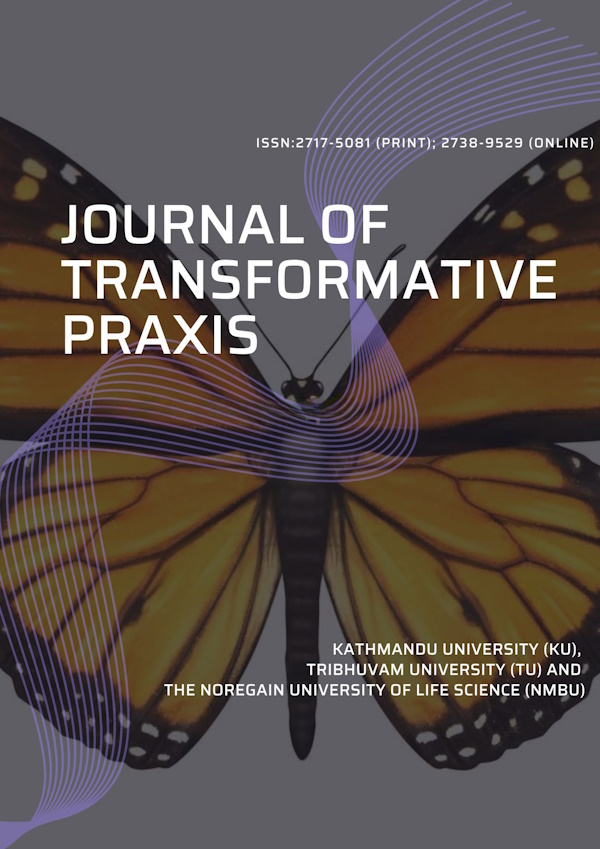
Journal of Transformative Praxis, Volume 5, Issue 1, 2024, 95-106, https://doi.org/10.51474/jrtp/15756
Online publication date: Jul 04, 2024
Publication date: Dec 31, 2024
Views: 935 | Downloads: 500
Reference: Dhungana, S. (2024). Ways of Enhancing Harmony among Teachers and Students: A Critical Reflection. Journal of Transformative Praxis, 5(1), 95-106. https://doi.org/10.51474/jrtp/15756
Reference: Dhungana S. Ways of Enhancing Harmony among Teachers and Students: A Critical Reflection. Journal of Transformative Praxis. 2024;5(1):95-106. https://doi.org/10.51474/jrtp/15756
Reference: Dhungana S. Ways of Enhancing Harmony among Teachers and Students: A Critical Reflection. Journal of Transformative Praxis. 2024;5(1), 95-106. https://doi.org/10.51474/jrtp/15756
Reference: Dhungana, Sandip. "Ways of Enhancing Harmony among Teachers and Students: A Critical Reflection". Journal of Transformative Praxis 2024 5 no. 1 (2024): 95-106. https://doi.org/10.51474/jrtp/15756
Reference: Dhungana, S. (2024). Ways of Enhancing Harmony among Teachers and Students: A Critical Reflection. Journal of Transformative Praxis, 5(1), pp. 95-106. https://doi.org/10.51474/jrtp/15756
Reference: Dhungana, Sandip "Ways of Enhancing Harmony among Teachers and Students: A Critical Reflection". Journal of Transformative Praxis, vol. 5, no. 1, 2024, pp. 95-106. https://doi.org/10.51474/jrtp/15756
- Bizimana, B. (2023). A Phenomenological study of student thinking autonomy: Analysis of student-teacher interactions from Rwandan teacher training colleges [Unpublished doctoral dissertation]. University of Rwanda.
- Boekaerts, M. (2007). Understanding students' affective processes in the classroom. PA Schutz, & R. Pekrun içinde, Emotion in education (37-56). APA PsycNet.
- Bundsgaard, J. (2019). Using technology to scaffold progressive teaching. In Z. Babaci-Wilhite, Promoting language and steam as human rights in education: science, technology, engineering, arts and mathematics, (pp.109-124). Springer.
- Chevalier, J. M., & Buckles, D. J. (2019). Participatory action research: Theory and methods for engaged inquiry. Routledge. https://doi.org/10.4324/9781351033268
- Dahal, N. (2022). Transformative STEAM Education as a Praxis-Driven Orientation. Journal of STEAM Education, 5(2), 167-180. https://doi.org/10.55290/steam.1098153
- Dahal, N., Luitel, B. C., & Pant, B. P. (2019). Teacher-students relationship and its potential impact on mathematics learning. Mathematics Education Forum Chitwan, 4(4), 35-53.
- Dail, W. (2013). On cultural polymathy: How visual thinking, culture, and community create a platform for progress. The STEAM Journal, 1(1), 7. https://doi.org/10.5642/steam.201301.07
- Daugherty, M. K. (2013). The prospect of an" A" in STEM education. Journal of STEM Education: Innovations and Research, 14(2). 10-15.
- De Corte, E., Depaepe, F., Op’t Eynde, P., & Verschaffel, L. (2011). Students’ self-regulation of emotions in mathematics: An analysis of meta-emotional knowledge and skills. ZDM (Fullform 43, 483-495.
- Dhungana, P. (2022). Developing a living model of professional development of schoolteachers in Nepal: A collaborative epistemic journey [Unpublished doctoral dissertation]. Kathmandu University.
- Dhungana, P. (2023a). Ways of enhancing joyful teaching and learning in a graduate class of Nepal. Educational Journal of Living Theories, 16(1). 28-48.
- Dhungana, S. (2023b). Integrating STEAM Pedagogy in Secondary Mathematics: A Participatory Autoethnographic inquiry [Unpublished MPhil dissertation]. Kathmandu University.
- Dirkx, J. M. (1997). Nurturing soul in adult learning. New Directions for Adult and Continuing Education, 74, 79-88. https://doi.org/10.1002/ace.7409
- Illeris, K. (2014). Transformative learning and identity. Journal of Transformative Education, 12(2), 148-163. doi.org/10.1177/1541344614548423
- Liao, C. (2016). From interdisciplinary to transdisciplinary: An arts-integrated approach to STEAM education. Art Education, 69(6), 44-49. doi.org/10.1080/00043125.2016.1224873
- Luitel, B. C. (2013). Mathematics as an im/pure knowledge system: Symbiosis, (W) Holism and synergy in mathematics education. International Journal of Science and Mathematics Education, 10(6) 65-87.
- Manandhar, N. K. (2022). A brickworker becomes transformative STEAM Educator: Journey of resistance, advocacy, and envisioning. Journal of Transformative Praxis, 3(1), 59-74.
- Martínez-Sierra, G., & García-González, M. D. S. (2016). Undergraduate mathematics students’ emotional experiences in linear algebra courses. Educational Studies in Mathematics, 91(1), 87-106.
- Ministry of Education. (2016). School sector development plan 2016-2013. Authors.
- Pant, B. P. (2015). Pondering on my beliefs and practices on mathematics, pedagogy, curriculum and assessment [Unpublished MPhil's dissertation]. Kathmandu University.
- Pant, S. K., Luitel, B. C., & Pant, B. P. (2020). STEAM pedagogy as an approach for teacher professional development. In Mathematics Education Forum Chitwan (Vol. 5, No. 5, pp. 28-33).
- Quigley, C. F., Herro, D., & Jamil, F. M. (2017). Developing a conceptual model of STEAM teaching practices. School Science and Mathematics, 117(1-2), 1-12.
- Root-Bernstein, R. S. (2003). The art of innovation: Polymaths and the universality of the creative process. International handbook of innovation 1(1), 267-278.
- Saldana, J. (2014). Coding and analysis strategies. In P. Leavy (Ed.), The Oxford handbook of qualitative research (Oxford Library of Psychology). Oxford Academic. https://doi.org/10.1093/oxfordhb/9780199811755.013.001
- Sheffield, R. S., Koul, R., Blackley, S., Fitriani, E., Rahmawati, Y., & Resek, D. (2018). Transnational examination of STEM education. International Journal of Innovation in Science and Mathematics Education, 26(8), 67-80.
- Shrestha, I. M. (2018). My Pedagogical sensitisation towards holistic mathematics education: A practitioner’s inquiry [Unpublished M. Phil. dissertation]. Kathmandu University.
- Taylor, P. C., Taylor, E., & Luitel, B. C. (2012). Multi-paradigmatic transformative research as/for teacher education: An integral perspective. Second international handbook of science education, (pp. 373-387). Springer.
- Taylor, P.C. (2013). Research is transformative learning for meaning-centred professional development. In O. Kovbasyuk & P. Blessinger (Eds.), Meaning-centred education: International perspectives and explorations in higher education (pp. 168-185). Routledge.
- Ulla, M. B. (2018). Benefits and challenges of doing research: Experiences from Philippine public-school teachers. Issues in Educational Research, 28(3), 797-810.
- UNESCO. (2018). UNESCO ICT competency framework for teachers. UNESCO.
- Yakman, G., & Lee, H. (2012). Exploring the exemplary STEAM education in the US as a practical educational framework for Korea. Journal of the Korean Association for Science Education, 32(6), 1072-1086. https://doi.org/10.14697/jkase.2012.32.6.1072
I would like to thank the University Grants Commission (UGC) Nepal for providing financial support through the MPhil Research Fellowship program, which has enabled me to accomplish this study as a young researcher. This article is part of my MPhil dissertation.
No conflict of interest was reported by the author in the article.
This work is licensed under a Creative Commons Attribution-ShareAlike 4.0 International License.
